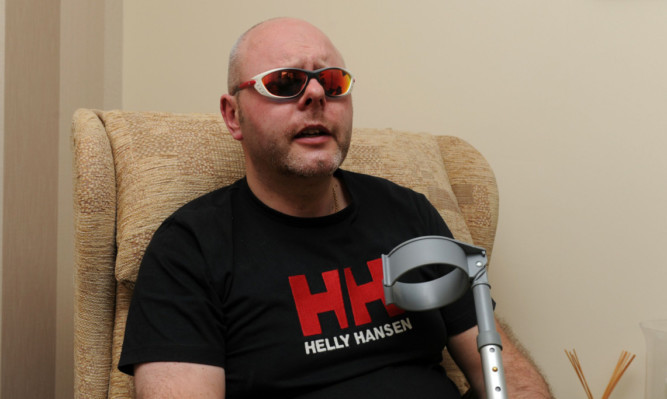An Angus man has claimed funding care restrictions have left him a social outcast and a prisoner in his own home.
Keith Swankie, a former supermarket manager from Arbroath, has a rare and fatal neurological disease called Progressive Supranuclear Palsy (PSP).
The rare condition will eventually kill him and Mr Swankie said he wants to enjoy what time he has left instead of “fighting for basics.”
Mr Swankie will meet Health Secretary Shona Robison on Monday and urge her to bring in Frank’s Law which is the roll-out of free personal care to under-65s with debilitating illnesses.
It is named after the late Dundee United legend Frank Kopel who died in April having been diagnosed with vascular dementia and Alzheimer’s six years ago, aged just 59.
The face-to-face meeting in Arbroath will also give Mr Swankie a chance to discuss what he considers the lack of awareness and support for people suffering from PSP.
PSP is caused by the progressive death of nerve cells in the brain, causing difficulty with balance, movement, vision, speech and swallowing.
Mr Swankie was diagnosed in April 2012, more than two years after suffering from eye problems, and the life expectancy from onset is thought to be around eight years.
He said he will be telling the health secretary about the struggles he faces on a daily basis because he doesn’t qualify for free personal care.
“I’ve been a prisoner in my own home for over a year and a half due to extreme costs for care as I am under 65,” said Mr Swankie.
“I’m in a position similar to Amanda Kopel’s (Frank’s widow) fight and it looks like I am going to either need the car at the door or a powered wheelchair controlled by others to get to the top of the path from my house.”
Mr Swankie had to sell his home to his critical illness insurance taking so long to pay out and the family bought a new house which was adapted to suit his future needs.
He said local authority care costs increased dramatically which led to the family cancelling support and since May 2013 Mr Swankie has had to rely on his family.
But with his wife Sheelagh still working so the bills can be paid, his pensioner parents have been helping him around the home but now his mother is in poor health and can’t continue to assist.
“So whilst my wife works I have become a social outcast and prisoner in my own home for the last 18 months which has had a huge impact on my mental health and mood,” he said.
“PSP is both a physical and mentally progressive terminal disease but there is no joint team to manage people with this kind of neurodegenerative disease.
“That’s another major flaw in the care system and it can also affect the funding you receive for your care needs.”
Mr Swankie said his own health has deteriorated since December and he feels the constant fight for basic support has also taken its toll.
“If I was over 65 this wouldn’t be an issue,” said the dad of two. “It’s something that needs addressed so terminal patients can enjoy their dying days without constantly having to battle.”
Free personal care is currently only available for everyone aged 65 and over in Scotland who have been assessed by the local authority as needing it.
Health secretary Shona Robison said she was keen to look at the issue of extending free personal care “in more detail.”
